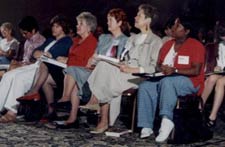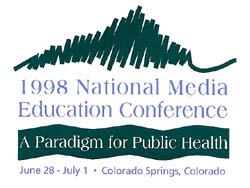Partnership for Media Education
|
|
Collaboration Creates Momentum for National Conferences
The movement for media literacy in the United States has emerged from a plethora of individual projects and activities throughout the country, each sustained more often than not by the passion and commitment of a single individual, a grassroots organization or a small group of teachers, parents or community leaders.
As the field expanded during the early 1990's the need for a regularly-scheduled national conference for ongoing professional growth and long-term development became more and more urgent. Initial conferences in Boone, NC in 1995 and Los Angeles in 1996 were well attended and praised but the financial and organizational infrastructure to sustain a national conference year after year simply did not exist.
 In 1997, a telephone conference call between four women leaders of the media literacy movement broke the impasse. At the initiation of Lisa Reisberg, then communications director of the American Academy of Pediatrics, the call included Elizabeth Thoman, executive director of the Center for Media Literacy in Los Angeles, Renee Hobbs, Director of the Media Literacy Project at Babson College, near Boston, and Nancy Chase Garcia, at the time a staff member of the Center for Substance Abuse Prevention in Washington. By the end of the call they agreed in principle to create the Partnership for Media Education (PME), a nonprofit organization that would be incorporated solely to facilitate the holding of national conferences for "knowledge dissemination" about media literacy for people new to the field as well as professional development for those already in the field. The PME organized and hosted three national events starting in 1998.
In 1997, a telephone conference call between four women leaders of the media literacy movement broke the impasse. At the initiation of Lisa Reisberg, then communications director of the American Academy of Pediatrics, the call included Elizabeth Thoman, executive director of the Center for Media Literacy in Los Angeles, Renee Hobbs, Director of the Media Literacy Project at Babson College, near Boston, and Nancy Chase Garcia, at the time a staff member of the Center for Substance Abuse Prevention in Washington. By the end of the call they agreed in principle to create the Partnership for Media Education (PME), a nonprofit organization that would be incorporated solely to facilitate the holding of national conferences for "knowledge dissemination" about media literacy for people new to the field as well as professional development for those already in the field. The PME organized and hosted three national events starting in 1998.
1998: National Media Education Conference / June 28-July 1 /Colorado Springs, CO  "A Paradigm for Public Health" was the theme of the 1998 conference which attracted over 450 participants including long-time and knowledgeable media literacy educators from all levels rubbing shoulders with new enthusiasts from the health and prevention fields. With significant funding from federal agencies in the prevention field as well as private foundations, the conference was able to attract national press and feature leading speakers. National Public Radio journalist Ray Suarez keynoted the conference along with researcher Erica Austin and television historian Robert Thompson. A pre-conference introductory day — "Media Literacy 101" — proved popular along with dozens of workshops and panels featuring national leaders: Jackson Katz, Jane Brown, Victor Strasburger, MD, Joanne Cantor, John DeGraaf, Ana Nogales, Katy Abel and Paul Klite.
"A Paradigm for Public Health" was the theme of the 1998 conference which attracted over 450 participants including long-time and knowledgeable media literacy educators from all levels rubbing shoulders with new enthusiasts from the health and prevention fields. With significant funding from federal agencies in the prevention field as well as private foundations, the conference was able to attract national press and feature leading speakers. National Public Radio journalist Ray Suarez keynoted the conference along with researcher Erica Austin and television historian Robert Thompson. A pre-conference introductory day — "Media Literacy 101" — proved popular along with dozens of workshops and panels featuring national leaders: Jackson Katz, Jane Brown, Victor Strasburger, MD, Joanne Cantor, John DeGraaf, Ana Nogales, Katy Abel and Paul Klite.
1999 /NMEC / June 27-30 / St. Paul, MN  Teachers, youth leaders, religious and community leaders, prevention specialists, and others joined together for the St. Paul conference: "Taking Charge in Changing Times" — the most comprehensive US media literacy conference yet. With a focus on media literacy in K-12 education, the conference was a literal "who's who" of US and Canadian media literacy leaders, including David Considine, Frank Dawson, Barry Duncan, Andrew Garrison, Renee Hobbs, Deborah Leveranz, Duane Neil, John Pungente, Karon Sherarts, Elizabeth Thoman, Fran Trampiets, Kathleen Tyner, Chris Worsnop, and many more. Media production was a major subtheme with a day-long preconference session on "Hands-On Video Production in the Classroom" and a closing panel of youth media makers showcasing their video visions of the world. Keynote speakers included:
Teachers, youth leaders, religious and community leaders, prevention specialists, and others joined together for the St. Paul conference: "Taking Charge in Changing Times" — the most comprehensive US media literacy conference yet. With a focus on media literacy in K-12 education, the conference was a literal "who's who" of US and Canadian media literacy leaders, including David Considine, Frank Dawson, Barry Duncan, Andrew Garrison, Renee Hobbs, Deborah Leveranz, Duane Neil, John Pungente, Karon Sherarts, Elizabeth Thoman, Fran Trampiets, Kathleen Tyner, Chris Worsnop, and many more. Media production was a major subtheme with a day-long preconference session on "Hands-On Video Production in the Classroom" and a closing panel of youth media makers showcasing their video visions of the world. Keynote speakers included:
- Paul Friedlander, from the Rock 'n Roll Hall of Fame and Museum in Cleveland on "Rock Around the Class: Approaching Meaning in Music."
- Gunther Kress, leading scholar in the field of media education and professor of education at the University of London, on "Educating for an Unknowable Future."
- Ellen Hayakawa, international consultant to individuals, corporations and governments on spirituality in the workplace, on "Love the Work: Sustaining the Soul in Changing Times."
2000: Summit 2000 / May 13-17 / Toronto, Ontario "Summit 2000 - Children, Youth and the Media: Beyond the Millennium," was a one-time international conference organized by Canadian media industry leaders along with the media literacy education community in Canada. The PME decided to sponsor a series of late afternoon sessions specifically for the 300+ US participants at the conference that attracted 1300 people from all over the world. A networking reception was held on Saturday followed on Sunday by an "Outstanding Achievement Awards" ceremony to three PBS series and 3 cable television series which integrate media literacy principles in shows aimed at children and teens. "The State of Media Education in the 50 States" was Monday's panel session, followed on Tuesday by an open forum on "Laying the Foundation: Principles and Practices of Media Literacy."
"Summit 2000 - Children, Youth and the Media: Beyond the Millennium," was a one-time international conference organized by Canadian media industry leaders along with the media literacy education community in Canada. The PME decided to sponsor a series of late afternoon sessions specifically for the 300+ US participants at the conference that attracted 1300 people from all over the world. A networking reception was held on Saturday followed on Sunday by an "Outstanding Achievement Awards" ceremony to three PBS series and 3 cable television series which integrate media literacy principles in shows aimed at children and teens. "The State of Media Education in the 50 States" was Monday's panel session, followed on Tuesday by an open forum on "Laying the Foundation: Principles and Practices of Media Literacy."
At the conclusion of the 1998 conference in Colorado Springs there was an open meeting to explore the continuing future of the PME. Sixty people attended, and many offered to help work on another conference. New board members were added and planning for a second conference got underway. At St. Paul, another 50-60 people voluntarily arrived for breakfast, leading to more new members for the board and the goal of exploring how to turn the PME into a national membership organization that would provide the infrastructure for building the field of media literacy education in the USA and calling a continuing conference every two years. After hosting events for U.S. educators at the Canadian Summit 2000 conference in May, the PME officially evolved into the Alliance for a Media Literate America (AMLA) at a Board retreat in Sundance, Utah in the fall of 2000, calling a founding conference for June 2001 in Austin, Texas.



